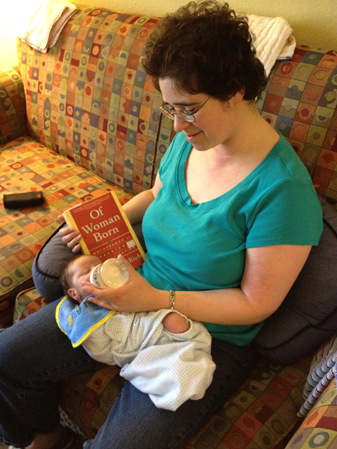Nowadays, more often than not, when I listen to a sermon or read a Christian spiritual guide with friends, a moment will arise when my inner reaction to the text seems contrary to what everyone else is getting out of it. They’re seeing an inspiring picture on the right side of the tapestry, while I’m underneath looking at the loose threads and snarled knots. Like the optical illusion that’s either a vase or two kissing faces, one can at best switch back and forth between these two views, not hold them side by side. Or so I tell myself, those times when I keep my critique under wraps, not wanting to be the death’s-head at the feast who spoils the faith that others need for comfort.
I don’t know that I have less faith that my neighbors in the pews, just faith in different things, and perhaps too little patience with beliefs and attitudes that (in my opinion) distract from our most urgent afflictions and their best cures. Astute readers of this blog will remember that I’ve always been this way, but also notice that my priorities list has been more changeable than my fervor. This awkward mutability gives me another reason to think twice before challenging the group’s consensus.
As far as is consistent with kindness and timeliness, of course, I nonetheless believe every serious engagement with a spiritual text should eventually include the deconstructionist questions, “What is the power position of the author and his/her assumed audience?” and “What perspectives are being left out?”
Advocates of traditional, conservative education (and such a one was I!) have confused deconstructionism with moral relativism. Quite the contrary. The questions above are attempts to bring a consciousness of justice into how we read a text, to take responsibility for our standpoint and our blind spots.
True, in the prideful and competitive culture of academia, these questions have been deployed in bad faith, to dismiss intellectual rivals by labeling them “oppressors”, exactly as their conservative Christian counterparts would exploit the label “heretics”. But the inquiry into power dynamics and incompleteness need not be a bug hunt. It should simply be a nonjudgmental acknowledgment that no text is completely satisfying because the ideal community is always more diverse than one perspective can encompass. This acknowledgment would clarify that members who enter the discussion from an unrepresented standpoint are welcome contributors, not spoilers.
For instance, I belong to a weekly discussion group that’s currently studying the Examen, a daily prayer practice developed by St. Ignatius of Loyola. One of our members, a retired priest, observed that this practice was developed by monastics who had the privilege of contemplation because their daily subsistence needs were met by the community. We have a similar luxury of prayer time as middle-class Americans, if we choose to use it that way, of course. He wondered whether the Examen would be possible or relevant for a desperately poor person such as those he had served in his past congregation–someone whose entire attention was taken up with keeping her kids fed and her house from collapsing.
I found this question uncomfortable in a good way. It added another layer to the repentance and gratitude themes of the Examen by reminding me that my experience was not the center of the universe. It opened the door to other fruitful questions: Is contemplative prayer at the top of Maslow’s hierarchy of needs, worth considering only after basic physical security is established? Or is it necessary at every level of survival, so that (as the Buddha would say) we don’t add to our suffering by becoming entangled in fear, anger, and greed? If the latter, how would the Examen best be adapted to be useful and validating to someone living on the margins? To take that question seriously, we would have to work harder to include such people in our discussion group, instead of making guesses about their spiritual needs from our standpoint.
For further reading on these themes, I recommend:
James K.A. Smith, Who’s Afraid of Postmodernism? Taking Derrida, Lyotard, and Foucault to Church (Baker Academic, 2006)
John D. Caputo, What Would Jesus Deconstruct? (Baker Academic, 2007)
Crystal L. Downing, How Postmodernism Serves (My) Faith: Questioning Truth in Language, Philosophy, and Art (IVP Academic, 2006)

